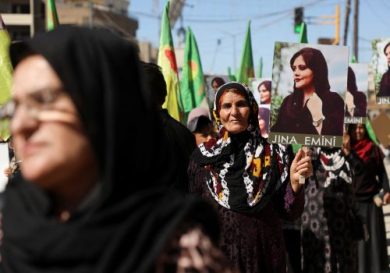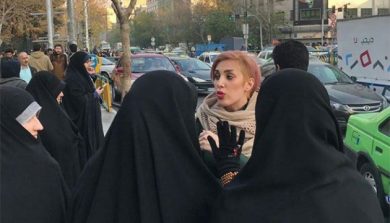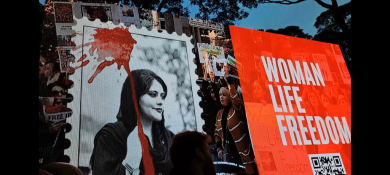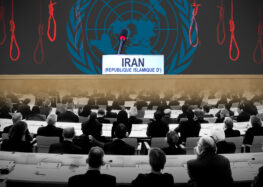In Iran, women who dare to speak out against oppression often find themselves behind bars. The Islamic Revolutionary Guard Corps (IRGC), acting as the regime’s enforcer, has systematically arrested, tortured, and imprisoned women journalists, activists, and protestors in an effort to silence them. However, even within the walls of Iran’s most notorious prisons, these women continue to resist, proving that the fight for freedom and human rights cannot be contained.
This article explores:
• The role of the IRGC in imprisoning women activists.
• Conditions inside Iranian prisons and the tactics of repression used against women.
• The stories of brave women who continue to fight from behind bars.
• The global response and how the world can help.
1. The IRGC’s Systematic Targeting of Women
A. Women as a Threat to the Regime
For decades, Iranian authorities have criminalized dissent, labeling peaceful protests, journalism, and activism as threats to national security. Women, who have led movements for gender equality and political freedom, are seen as particular threats to the Islamic Republic’s rule.
B. Charges Used to Silence Women
Women are frequently arrested under vague and politically motivated charges, including:
• “Spreading propaganda against the state”
• “Acting against national security”
• “Encouraging corruption and prostitution” (often used against those who remove the hijab)
• “Collaboration with hostile foreign entities”
These fabricated charges allow the regime to justify imprisoning activists while attempting to delegitimize their work.
2. Life Inside Iran’s Women’s Prisons
A. Evin Prison: The “Hell for Political Prisoners”
Evin Prison in Tehran is notorious for its harsh treatment of political prisoners, including women. Under IRGC supervision, women here face:
• Torture and beatings during interrogations.
• Solitary confinement for months in cramped, dark cells.
• Sexual harassment and threats of assault to break their spirit.
• Lack of medical care, causing long-term health damage.
Many women in Evin are held without trial, enduring years of imprisonment with no due process.
B. Qarchak Prison: One of the Worst in the World
Qarchak Prison, southeast of Tehran, has been described as one of the worst prisons for women globally. Prisoners here report:
• Severe overcrowding in unsanitary conditions.
• Mixing of political prisoners with violent criminals, exposing activists to constant danger.
• Psychological and physical torture, including forced confessions.
• Denial of family visits and legal representation.
Despite these conditions, women in Qarchak continue to resist, going on hunger strikes, writing letters to human rights organizations, and refusing to stay silent.
3. Stories of Courage: Women Resisting from Behind Bars
A. Narges Mohammadi: A Nobel Peace Prize Winner in Prison
Narges Mohammadi, a leading human rights activist, has spent years in IRGC-controlled prisons for her work against the death penalty and women’s rights violations.
• Despite being tortured, she continues to speak out from prison.
• Her letters describe brutal conditions and demand accountability for human rights abuses.
• In 2023, she was awarded the Nobel Peace Prize, proving that imprisonment cannot silence the truth.
B. Nasrin Sotoudeh: The Lawyer Who Defends the Voiceless
Nasrin Sotoudeh, a human rights lawyer, has defended women arrested for refusing to wear the hijab. For her work, she was sentenced to 38 years in prison and 148 lashes.
• Despite harsh treatment, she continues to fight for prisoners’ rights.
• Her case has drawn global attention, pressuring Iran to release her.
C. Sepideh Gholian: A Journalist Who Refuses to Be Broken
Sepideh Gholian, a labor rights activist, was arrested for covering workers’ protests.
• She has been tortured and forced into false confessions.
• After her release, she publicly protested in front of Evin Prison—only to be re-arrested immediately.
• Her bravery has made her a symbol of resistance.
4. How the IRGC Uses Prison as a Weapon of Fear
A. Forced Confessions and Televised Propaganda
The IRGC forces imprisoned women to confess under torture, then broadcasts these forced confessions on state TV to discredit activists.
B. Psychological Warfare Against Families
• The IRGC threatens family members of prisoners, warning them not to speak out.
• Women prisoners are often denied family visits, adding to their suffering.
C. Sexual Violence as a Tool of Control
Reports have surfaced of sexual abuse of female prisoners, a deliberate tactic to break their resistance. Despite the risk, many survivors choose to speak out, ensuring these crimes do not remain hidden.
5. Global Reactions and the Fight for Freedom
A. International Condemnation of Iran’s Political Prisons
• Human rights organizations, including Amnesty International, have condemned Iran’s treatment of women prisoners.
• The United Nations has called for the immediate release of all prisoners of conscience.
B. The Role of the Iranian Diaspora
• Iranian activists living abroad continue to speak out against the IRGC’s abuses.
• Campaigns like #FreeIranianWomen and #BanIRGC have gained international traction.
C. Calls for More Sanctions on the IRGC
• The United States has already designated the IRGC as a terrorist organization.
• Activists demand that the European Union and other governments do the same, ensuring economic and diplomatic pressure on Iran’s regime.
6. How the World Can Help
A. Pressure Governments to Demand the Release of Political Prisoners
• Governments worldwide must make the release of women prisoners a priority in diplomatic relations with Iran.
• More countries should impose targeted sanctions on officials responsible for human rights abuses.
B. Support Digital Activism
• Social media campaigns keep political prisoners’ stories alive.
• VPNs and encrypted communication tools help activists share information without IRGC surveillance.
C. Amplify Voices of Women in Prison
• Media outlets must continue covering the plight of female political prisoners.
• The Iranian diaspora must advocate for their release through petitions, protests, and awareness campaigns.
Conclusion: Courage That Cannot Be Caged
Despite brutal repression, Iranian women continue to fight for freedom and justice, even from within prison walls. The IRGC’s efforts to silence them have failed—their voices echo louder than ever.
Women like Narges Mohammadi, Nasrin Sotoudeh, and Sepideh Gholian are not just prisoners; they are leaders of a movement that refuses to be broken.
Join Our Newsletter!
Stay informed with the latest updates, news, and ways to take action in the fight for justice and global security. Sign up now to get updates delivered straight to your inbox!





